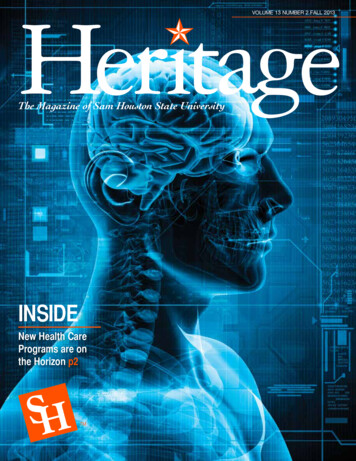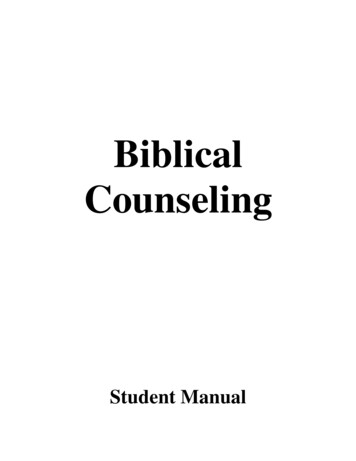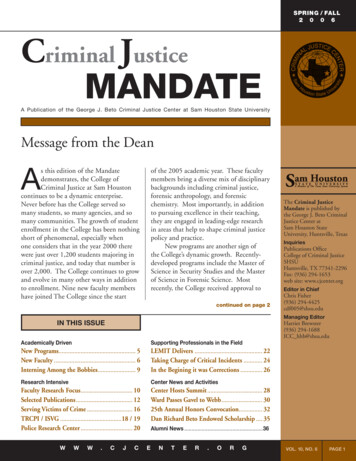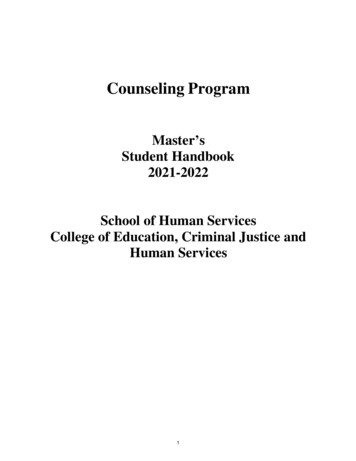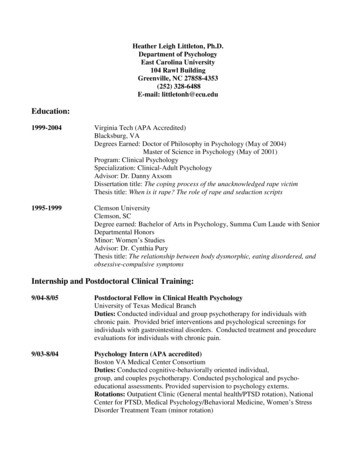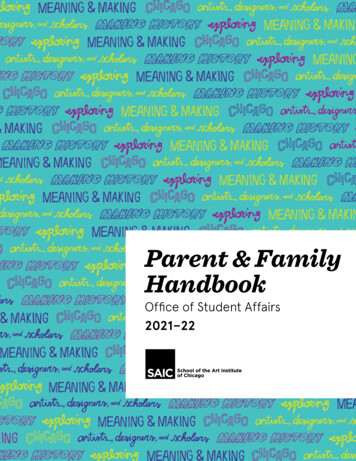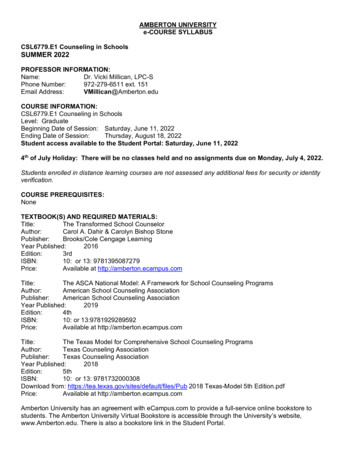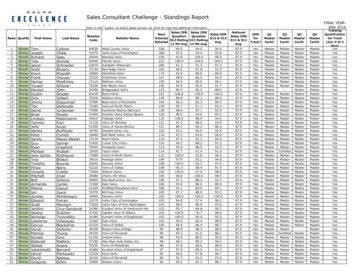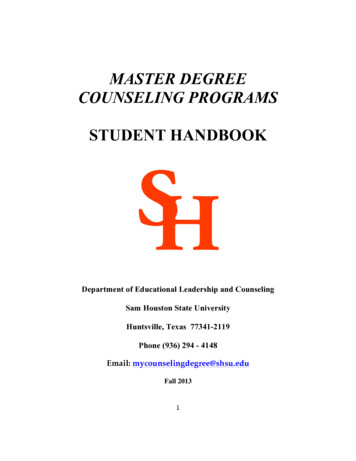
Transcription
MASTER DEGREECOUNSELING PROGRAMSSTUDENT HANDBOOKDepartment of Educational Leadership and CounselingSam Houston State UniversityHuntsville, Texas 77341-2119Phone (936) 294 - 4148Email: mycounselingdegree@shsu.eduFall 20131
TABLE OF CONTENTSIntroduction . . 5Letter to Students . 6Professional Identity . 7Philosophy . . . 8About Your Certification and Licensure Options . . 8Clinical Mental Health Counseling/Licensed Professional Counselor(LPC) . 9School Counseling 9Pre-requisites for Program Admission . 11Course Prerequisites . 14Degree Requirements . . 15M.Ed. School Counselor and Certification . 15M. A. Clinical Mental Health Counseling (LPC) 16Examples of the Sequence of Courses School Counselor Track for Full and Part-Time Students Clinical Mental Health Counseling (LPC) Track for Full andPart-Time Students . . . Clinical Mental Health Counseling (LPC) Students Seeking Marriageand Family Coursework for LMFT . 18181920Course Advisement For Master’s In Counseling Program . 21Counseling Program Faculty and Staff . 22Campus Services 24BearKat One Card. . 24Academic Library 242
Writing Center . 24University Counseling Center . 25Career Planning and Placement Center 25Computer Services 25Initial Academic Procedures . . 26Initial Entry Into the Program . 26Three Possible Types of Admission to Graduate Studies . 26Prior to Registration . 27Candidacy for the Master’s Degree . 28Upon Completion First 15 Semester Hours of Coursework 28Procedures For Filing For Candidacy 28Professional Review of Counseling Students . . 30Semester Before Enrolling in COUN 6376 Supervised Practicum 30Semester Before Enrolling in COUN 6386I Field Internship . 30During Semester Enrolled in COUN 6386I Field Internship 31Procedures for Recommending Students for Credentialing/Employment . 31Remediation Protocol for Master’s Candidacy Applicants . 31Exclusion of Students . 34Grievance Policy 34Practicum /Clinical Information Philosophy .Practicum Curriculum Practicum Requirements .37373737COUN 5385 Pre-Practicum: Techniques of Counseling . 39COUN 6374 Practicum in Group Counseling . 39COUN 6376 Supervised Practice in Counseling . 39Supervision .40Services 40Client Case Assignments and Procedures . 413
Procedures for Scheduling or Obtaining Counseling 41Procedures for Counseling Sessions . 41Care and Maintenance of Clinical Records 42Audio taping and Videotaping 42Student Liability Insurance . 43Referral Services and Relationship with Other Agencies . 43Code of Ethics / Confidentiality . 43COUN 6386 I and II Field Internship . 45Pre-Class Procedures . 45Course Requirements . 45Appendices . 46Appendix A: Temporary Study Plans . . 47Clinical Mental Health Counseling 47School Counseling 48Appendix B: Counselor Potential Scale . . 49Appendix C: Pre-Practicum Proficiencies .50Appendix D: Supervised Practicum Proficiencies 51Appendix E: Writing Standards 534
IntroductionThe Counseling Program at Sam Houston State University offers a Master of Educationin School Counseling, a Master of Arts Degrees in Community Mental Health Counseling and aDoctor of Philosophy Degree in Counselor Education.The Community Mental HealthCounseling program and the Doctor of Philosophy are accredited by the Council forAccreditation of Counseling and Related Educational Programs (CACREP). Two counselingclinics, Jack Staggs Clinic at SHSU campus in Huntsville and SHSU Community CounselingClinic the Woodlands are affiliated with the Counseling program. During the semester studentsin the master’s programs and the doctoral program are enrolled in supervised practicum coursessee clients in the Jack Staggs Clinic and the SHSU Community Counseling Clinic. The clinicsoperate with the dual purposes of clinical training and community service. The Counselingprogram is a component of the Department of Educational Leadership and Counseling,accountable through the Department Chairperson to the Dean of the College of Education andthe Academic Vice-President of the University.This Handbook outlines the two Master Degrees and the School Counseling Certificationprograms and presents a description of related policies and procedures established by theDepartment of Educational Leadership and Counseling. The Handbook is available to allstudentsintheprogramonlinehttp://www.shsu.edu/ edu elc/documents/masterhandbook.pdfbygoingtoStudents are responsible forfollowing these policies and procedures, in addition to those stated in the Graduate Catalog ofthe University. The Graduate Catalog is available at : http://www.shsu.edu/gradcat/toc.htmlPlease read this Handbook thoroughly. During the first class meeting of COUN 5111,Orientation to the Counseling Profession, students will be asked to initial a statement on theTemporary Study Plan indicating they have read the Handbook. In addition, students will beasked to initial a statement on the Temporary Study Plan indicating they have read the .pdf5availableonlineat:
Dear Students:Welcome to the Counseling Program at Sam Houston State University!This is an exciting time to be part of our program. The M.Ed. and M.A. programs in Counselingare highly regarded in this region. The counseling faculty are constantly working to improve theprograms to make certain we provide quality training and learning opportunities for you.The purpose of this Handbook is to inform you about the many details involved in going throughthe Master's programs and to explain to you about the facilitation of our clinical component, theSupervised Counseling Practicum. We have also included information about the Cycle ofCourses, a step-by-step guide for "getting through the academic system” as well as details aboutthe Supervised Practicum, Field Internship and the comprehensive examination.Because growth is ongoing, changes in policies and procedures may occur throughout thesemester. The Handbook will be updated with the new information as quickly as possible.Written announcements of changes will be circulated in face-to-face classes and by Listserv forstudents enrolled in online courses. Everyone (students, staff, faculty, and administration) isaccountable for implementing the change as soon as the change has been announced.Please become very familiar with those details in the Handbook which will affect you and youracademic career. Feel free to ask faculty or staff members about anything you do not understand.It is our goal to support and assist you in any way possible as you undertake this adventure inprofessional and personal growth.Sincerely,Yvonne Garza, Ph.D.Counseling Program Coordinator6
PROFESSIONAL IDENTITYA comprehensive mission statement has been developed, with input from core faculty whichbrings the counseling program into focus and concisely describes the intent and purpose of theprogram. The mission statement is publically available (i.e., department website and studenthandbook) and systematically reviewed to affirm that the mission of the program is aligned withthe mission and goals of Sam Houston State University. Faculty reviewed the mission statementin 2006 prior to the Clinic Mental Health Program being implemented and it was reviewed againin 2013 with minor modifications. The most recent review resulted in a minor phrase addition of“at the master’s level.” This modification was to better distinguish the difference in focusbetween the mission statement for the doctoral program and masters. The web address forviewing our mission statement is: http://www.shsu.edu/ edu elc/index.htmlCounseling Program Mission StatementThe mission statement of the SHSU Counseling Program is to facilitate the development ofprofessional counseling generalists, at the master’s level, who play an active role in enhancingindividual, family, and community wellness in a diverse and changing world.Program Area GoalsWithin the context of this mission, the goals of the Counseling Program are to:v Provide assistance to qualified students in learning the knowledge and skills necessary toperform as competent and knowledgeable professionals in the counseling field. Thisincludes encouraging students to develop themselves as well-rounded individualscombining their academic experience, personal values, interests and individualpersonalities.v Provide academic coursework and clinical experience that support and enhance theprofessional development of the student that holds to the integrity of CACREP standards.v Facilitate the Supervised Counseling Practicum in both the Jack Staggs Counseling Clinicand Community Counseling Clinic at the Woodlands Center, primarily for clinicaltraining, where advanced graduate students have opportunities for direct client contactand individual and group supervision from counseling faculty and counselor educationdoctoral students. Because of the availability of practicum interns, the Supervised7
Counseling Practicum also provides assessment and counseling for the general public inboth the greater Huntsville and Woodlands region.v Promote understanding and acceptance of the cultural diversity of our society.v Model the standards of integrity, performance, and concern for clients’ welfare.The goals of the Counseling Program were most recently reviewed in 2013. Goals weredeveloped with consideration of input from a) the Master’s Advisory Board, b) former programgraduates as a part of the Master’s Advisory Board, and c) core faculty.Counseling faculty review the goals to ensure they meet the following requirements:1. Reflect the current knowledge and projected needs of a multicultural and pluralisticsociety.2. Reflect input from faculty, current and former students and cooperating agencies.3. Relate to program activities.4. Are written in a way that student training can be evaluated.PHILOSOPHYThe Counseling Program is based on the belief that the ultimate goal of counseling ismaximizing human effectiveness through facilitating human growth and development. Themajor responsibility of the counselor is seen as one of aiding individuals, couples, and families inthe acquisition of effective problem-solving and decision-making patterns that help to establishvalues and life objectives.The process of promoting effective decision-making behavior in others requires a firm belief inthe potential for growth within each individual. In addition, counselors need to have a soundbackground in the psychology of human behavior and development, and the necessary skills andtechniques to support clients to make desired changes.About Licensure and Certification OptionsClinical Mental Health Counseling/Licensed Professional Counselor (LPC)CACREP ACCREDITED PROGRAM (M.A. Degree)Students completing the 60 semester hour Clinical Mental Health/Licensed ProfessionalCounselor (LPC) track meet the academic requirements needed to apply for LPC-Intern in theState of Texas. To apply for the LPC-Intern, graduates must document coursework, face-to-facecounseling hours, and supervision time on forms available from the Texas State Board ofExaminers for Licensed Professional Counselors http://www.dshs.state.tx.us/counselor/ .Thisstate agency issues credentials for individuals who want to be recognized as having competencein the field ofcounseling. Texas State Board of Examiners for Licensed Professional8
Counselors issue LPC credentials to counselor’s in training that successfully complete requiredcoursework, supervised counseling experience, and pass the appropriate state examination.Upon completion of SHSU coursework, each graduate is responsible for taking steps necessaryto apply for the LPC-Intern. She/he will need to complete a 3000-hour (total work time) postmaster's degree internship under an LPC approved Supervisor. Although providing the academicrequirements for licensure is the responsibility of SHSU, the university has no responsibility forhelping the graduate meet the LPC-Intern supervised experience requirements followinggraduation. Each graduate is encouraged to do extra study for the LPC exam. Some graduatesfind a workshop designed to prepare applicants for the LPC examination useful. Moreinformation about the LPC can be found at the internet website for LPC athttp://www.dshs.state.tx.us/counselor.SHSU is a testing site for the National Counseling Examination (NCE). NBCC website addressis http://www.nbcc.org/. Students seeking more information about the NCE need to contractDr.Henriksen at rch008@shsu.edu.Clinical Mental Health Counseling/LPC with Marriage and Family electivesIn addition to meeting academic requirements for LPC, students enrolled in the Clinical MentalHealth Counseling Master of Arts program may select to take marriage and family electivecourses as part of the 60 semester hour degree. Adding the marriage and family courses willmeet the academic requirements needed to apply for an Associate’s License for a Marriage andFamily Therapist (LMFTA) in the State of Texas. Upon completion of SHSU coursework andgraduation from SHSU, graduates are responsible for taking steps necessary to apply for theLMFTA, where the student will need to complete 3,000 hours of which 1,500 hours must bedirect clinical services with 200 hours of supervision from an LMFT approved supervisor.Although providing the academic requirements for licensure is the responsibility of SHSU, theUniversity has no responsibility for helping the graduate meet the Associate LMFT supervisedexperience requirements following graduation. . The LMFT interned website address ishttp://www.dshs.state.tx.us/mft/. Students seeking more information about LMFT in Texas andthe requirements for adding this focus of study need to schedule an appointment with Dr. RickBruhn, faculty advisor for marriage and family coursework.School Counseling Certification (M.Ed. Degree)Applicants interested in the certificate program for school counselors should initially contact theCoordinator of the Counseling master’s degree programs to discuss certification requirements.The State Board of Education Certification (SBEC) requires school counselor applicants to have: Two years of teaching experience A master’s degree, and A passing score on the TExES examination for school counselors.9
The two years of teaching experience is not required prior to enrolling in the Master of Educationprogram at SHSU, however, it is required before SBEC will issue the school counselingcertification to applicants. Individuals needing the master degree should apply for the M.Ed.degree in Counseling, focusing on school counseling.Individuals needing two years of teaching experience should seek employment with a schooldistrict as a teacher. If the applicant is not certified to teach, she/he should contact theDepartment Chair for Curriculum and Instruction to obtain coursework necessary for teachercertification.Some applicants or enrolled students may be asked by a school administrator to seek a“Deficiency Plan” in order to be emergency certified as a school counselor. In order to obtain aDeficiency Plan, the applicant must provide a letter from a school district requesting the plan ondistrict letterhead and submit a 30 fee. Any previous graduate coursework which may applytoward the deficiency plan must meet the following criteria: The courses are no older than seven years old at the time the Deficiency Plan courses arecompleted.The courses must be substantially equivalent to courses used for school counselingcertification as required by the SHSU Counseling program.The school district must send the deficiency plan request to the College of Education UniversityCertification Officer in the Teacher Education Center Box 2119, Huntsville, TX 77341. TheCertification Officer will, upon receiving the written request from the student’s school district,consult with the Coordinator of the Counseling master’s degree to determine the appropriatecoursework to be completed and provide information on the State TExES examination requiredfor certification.School Counseling CertificationAfter passing the written comprehensive examination, students in the School Counseling trackwill be reported to SHSU Certification Office as approved to register for the TExES SchoolCounseling Examination (#152). To apply to take the TExES, students register with the StateBoard of Educator Certification (SBEC) sp Student’s must have a TEA identificationnumber in order to register for the TExES. Test dates and registration details for the TExESexamination are located at: http://texes.ets.org.NOTE: The State Board of Educator Certification (SBEC) has discontinued the practice ofissuing specialized certificates for special education counselor and vocational counselor. Allschool counselors are now certified under the general Professional Counselor Certificate.10
Pre-requisites for Program AdmissionA committee made up of full-time counseling faculty will make admissions decisions based upona holistic review of all of the following elements:1. An application for graduate studies completed at ApplyTexas and submitted to licationathttps://www.applytexas.org/adappc/gen/c start.WBX.2. Official transcripts of all college/university coursework, sent directly from the respectiveregistrars of the institution(s) to Graduate Studies.3. A grade point average of 2.6 overall (undergraduate) or 2.8 for the last 60 semester hours ofundergraduate coursework is required.4. Scores from either the Graduate Record Exam (GRE) general test or the Miller AnalogiesTest (MAT) no older than five years must be submitted to Graduate Studies.5. Three confidential reference evaluation forms completed from individuals who can validatean applicant’s potential for graduate study in counseling, as well as appropriateness for thecounseling profession. Copies of the reference forms are available online athttp://www.shsu.edu/ edu elc/documents/COUNMasterReferenceForm.pdfOne reference must be from a current or former employer/supervisor. One must be from aformer professor; a Certified School Counselor or a Licensed Counselor, Marriage andFamily Therapist, MSW or Psychologist. A third must be from someone other than a familymember. References must be mailed directly to the program from the individual completingthe reference form. Applicants should give each person submitting a reference a stampedenvelope addressed to: Department of Educational Leadership and Counseling, CounselingProgram Secretary; P.O. Box 2119, Sam Houston State University, Huntsville, TX 773412119.6. Six semester hours of undergraduate coursework in Abnormal Psychology, and HumanDevelopment, with a grade of “C” or better are required prerequisite courses. Applicantswho have not completed the two prerequisite courses may complete this requirement under aConditional Admission status for one semester.7. Satisfactory response to the following essay questions in no more than two typewritten,double-spaced pages total:a. What is your experience related to the counseling field, either paid or volunteer?b. What are your aspirations related to the field of counseling?c. Describe one or more significant life event(s) that contributed to the development ofthese aspirations.11
d. What is the one personal characteristic or quality that you most need to modify, improveor change in order to realize your aspirations?8. A pre-admission on-campus-screening interview. Applicants should contact the Jack StaggsCounseling Clinic secretary at (936) 294-1121 or the Counseling Program Secretary at (936)294-4148 to make an appointment for a pre-admission on-campus-screening interview.During the interview, applicants will respond to a set of structured questions. A SupervisedCounseling Practicum Intern will interview the applicant. Each interview will beelectronically recorded. Other Practicum Interns and the faculty member supervisingPracticum may observe through a one-way mirror. After the session is completed, the Internwill write a summary of the interview. The Faculty Supervisor will forward the summary ofthe interview and the DVD recording of the interview to the Counseling Program AdmissionsCommittee for final disposition. Applicants are encouraged to complete the interview byJuly 30 for fall admission, November 30 for spring admission and April 30 for summeradmission.The following essay question will be written immediately following the interview. (300words or less.)“What is your single greatest personal asset that will serve you in realizing youraspirations?”An additional writing prompt, responding to a vignette, will be completed at the same time.The counseling faculty may also consider performance in courses taken under Conditional orSpecial Admission status as part of the holistic assessment process.Probationary admission is occasionally extended to students whose educational backgroundsprovide compelling reasons for admission. Students admitted in this fashion must complete thefirst twelve semester-hours of graduate counseling courses under stipulations assigned by theDepartment Chair, Counseling Coordinator and Counseling Faculty, typically with a 3.5 graduategrade point average.Three letters of recommendation, responses to the essay questions and requests for furtherinformation must be directed to: Department of Educational Leadership and Counseling,Counseling Program Secretary, Sam Houston State University, Huntsville, Texas 77341-2119.Application information and form for the Master of Education is available at:http://www.shsu.edu/ grs www/Counseling M.Ed.html and for the Master of Arts at:http://www.shsu.edu/ grs www/Counseling M.A.html.Proposal to Transfer Credit12
In accordance with Academic Policy Statement 801007, graduate courses completed at otheraccredited colleges and universities may be applied as transfer credit toward the Master ofEducation and the Master of Art degrees. The maximum number of credit hours that may betransferred according to the policy are: 12 hours for a 48 hour degree and 15 hours for a 60 hourdegree. Only didactic courses will be considered for transfer credits. Practica courses will not beconsidered for transfer credits and all practica courses even those students have completed atanother university must be taken at SHSU. Once a student has been accepted into the program,consideration will be given to graduate work done at other accredited institutions in courses thatwere clearly at the graduate level with grade B or better, and appropriate to Counseling Programcourse requirements. In addition, all coursework, including the transferred credits, must becompleted within seven years from the earliest date of the first course applied to the masterdegree. Every request for transfer of credits is reviewed individually and the faculty advisor mustmake a recommendation on the student's behalf to the Vice President of Graduate Studies.When there is a question about accepting credit for didactic courses taken at other institutions,students must provide the course syllabus and/or catalog description of the course to documentsubstantial equivalence to SHSU courses.13
Course PrerequisitesOnce students have been accepted into the program, they should note the prerequisites forspecific courses in the program.COURSECOUN 5333COUN 5334COUN 5364COUN 5370COUN 5379COUN 5385COUN 5387COUN 5392COUN 5393COUN 5397COUN 5399COUN 6331COUN 6332COUN 6333COUN 6334COUN 6335COUN 6337COUN 6363COUN 6374COUN 6376COUN 6386ICOUN 6386IIPREREQUISITE(S)COUN 5397 (or concurrently)COUN 5397 and undergraduate course in AbnormalPsychologyAdmission to graduate program and COUN 5111 Orientationtaken concurrentlyCOUN 5397COUN 6363COUN 5364 and COUN 6363 (or concurrently)Permission of instructorAdmission to Graduate StudiesCOUN 5334, COUN 5364Undergraduate course in Human DevelopmentCOUN 5364, COUN 5397COUN 5399 or Instructor ApprovalCOUN 5364COUN 6332COUN 5385COUN 5333COUN 6332COUN 5364 (or concurrently)COUN 5364, COUN 5385COUN 5334, COUN 6374, Admission to Candidacy,completed or completing 33 semester hours (COUN 633 orconcurrent enrolled for student seeking a minor in MFT)COUN 6376COUN 6386IA copy of the Master of Education and Master of Arts Temporary Study Plans areavailable in Appendix A.14
Degree RequirementsM.Ed. (School Counselor) and CertificationForty-eight semester hours are required for the M.Ed. and for School CounselorCertification. Courses are organized in blocks that should be completed in sequence. Allstudents must pass the written comprehensive examination (NBCC) including subjectmatter from all required content areas.Block 1COUN 5111*Workshop: Orientation to the Counseling Master’s DegreeCOUN 5364Theories of CounselingCOUN 6363Assessment in Guidance and CounselingCOUN 5385Pre-Practicum: Techniques of CounselingCOUN 5397Human Growth and DevelopmentCOUN 5333School Counseling: Consultation, Coordination, andBlock 2COUN 5379COUN 5334COUN 6374COUN 5370Methods of ResearchEffective Human BehaviorPracticum in Group CounselingCareer Counseling Across the LifespanBlock 3COUN 6335School Counseling: Leadership, Advocacy, and Accountability**COUN 5392Cross-Cultural Issues in CounselingCOUN 5112Ethics in School CounselingElective (See options below) Select 2 elective courses if not taking LPC coursesCOUN 5392 and COUN 6332COUN 6376Supervised Practice in CounselingBlock 4**COUN 6332COUN 6386Theories of Marriage and FamilyField Practicum IBlock 5COUN 5110COUN 6386Workshop Elective (see advisor)Field Practicum II*Stem work course required for all students**Required for LPC Licensure. Students not seeking licensure may select other courses.15
Elective Options:COUN 5391Child and Adolescent CounselingCOUN 5393Clinical Mental HealthCOUN 5399Play Therapy BasicsCOUN 6333Techniques of Marriage and Family TherapyCOUN 6334Professional and Ethical Issues in CounselingCOUN 6337Counseling Clients with Sexual ConcernsCOUN 6364Counseling for AddictionsPlease refer to the list of prerequisite courses needed prior to enrolling in some of theelective courses.M. A. Clinical Mental Health Counseling (LPC)Sixty semester hours are required for the Clinical Mental Health Counseling/LicensedProfessional Counselor Master of Arts degree. Courses are organized in blocks that shouldbe completed in sequence. All students seeking the M.A. degree must pass the writtencomprehensive examination (NBCC) including subject matter from all required contentareas.Block 1*COUN 5111COUN 5364COUN 6363COUN 5385COUN 5397COUN 5379Block 2COUN 5334COUN 6374COUN 5370COUN 5392COUN 5112Workshop: Orientation to the Counseling Master’s DegreeTheories of CounselingAssessment in Guidance and CounselingPre-Practicum: Techniques of CounselingHuman Growth and DevelopmentMethods of ResearchEffective Human BehaviorPracticum in Group CounselingCareer Counseling Across the LifespanCross-Cultural Issues in CounselingWorkshop: Ethical and Professional Issues(Students may select COUN 6334 as an electiveto replace COUN 5112 and COUN 5110/5113)Block 3COUN 5391Child and Adolescent CounselingCOUN 5393Clinical Mental HealthCOUN 6376Supervised Practice in CounselingElective (see options below)Elective (see options below)Block 4COUN 5110 or COUN 5113 Workshop: Elective (Current Issues or MFT Assessment)COUN 6332Theories of Marriage and Family Therapy16
Elective (see options below)COUN 6386Field Practicum IBlock 5Elective (see options below)COUN 6386Field Practicum IIElective Options:COUN 5399COUN 6331**COUN 6333**COUN 6334**COUN 6337COUN 6364Play Therapy BasicsAdvanced Play TherapyTechniques in Marriage & Family TherapyProfessional and Ethical Issues in Counseling (take in placeof COUN 5112, students select a second section of COUN5110 or COUN 5113 to replace COUN 5112)Counseling Clients for Sexual ConcernsCounseling for Addictions*Stem work course required for all students** Students pursuing LPC and LMFT licensure must select these electives to meetacademic requirements for LMFT in Texas.17
Examples of the Sequence of CoursesSchool Counselor Track for Full and Part-Time Students (6-9 hrs.)Suggested degree plan for the School Counselor track, part-time student, six hoursper semester, or full-time student, nine hours per semester is as follows:6 Hour Example9 hour exampleSemester 1Semester 5Semester 1Semester 4COUN 5111COUN 5370COUN 5111COUN 6335COUN 5364COUN 6335COUN 5364COUN 6392COUN 6363COUN 6376COUN 6363COUN 5385Semester 2Semester 6COUN 5385COUN 5397COUN 5392COUN 6376Semester 3Semester 7COUN 5333COUN 6332COUN 5379COUN 6386 ISemester 2COUN 5397Semester 5COUN 6332COUN 5333COUN 6386 ICOUN 5379Semester 3Semester 6COUN 5334COUN 6386 IISemester 4Semester 8COUN 5370COUN 5334COUN 686 IICOUN 6374COUN 6374NOTE: COUN 5110 (add to a semester)COUN 5112 (add to a summer semester)NOTE: COUN 5110 (add to a semester)COUN 5112 (add to a summer semester)End of 48 Semester-Ho
The goals of the Counseling Program were most recently reviewed in 2013. Goals were developed with consideration of input from a) the Master's Advisory Board, b) former program graduates as a part of the Master's Advisory Board, and c) core faculty. Counseling faculty review the goals to ensure they meet the following requirements: 1.
